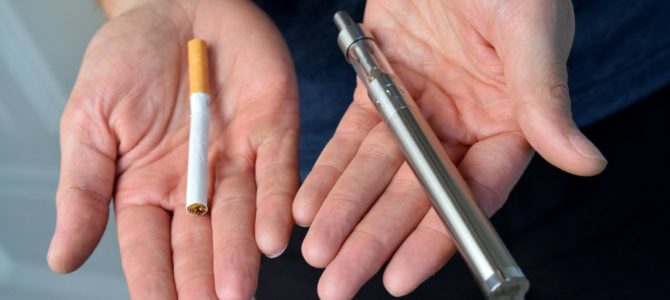
The Trump administration last week announced plans to ban most flavored e-cigarettes. New York just announced an emergency order to ban flavored vaping. A sixth person has died from vaping-related lung disease, according to the alarmists in news media.
CNN has proudly signaled its virtue by announcing it will no longer run Juul and other e-cigarette ads. A few weeks ago, my son shared with me that his public school anti-drug program focused almost entirely on discouraging vaping. That’s right, our leaders have prioritized the “threat” of vaping over heroin, cocaine, alcohol, and smoking.
In contrast to the six deaths now linked to vaping, cigarette-related illnesses account for 480,000 deaths every year, according to the Centers for Disease Control. Tobacco kills almost half a million Americans per year. In a typical month in America, smoking kills approximately as many Americans as died in the entire length of the Vietnam War.
Vaping, we are told, is not an overall benefit to public health because it draws its customers from non-smokers. This is a lie. The real outcry is a result of the fact that vaping poses an existential threat to the tobacco industry’s business model. Sales of cigarettes declined 11.2 percent in May 2019. This follows 18 consecutive months of decline in tobacco sales.
In the future, these declines in cigarette purchases will translate directly to a decline in deaths. An 11.2 percent decline in smoking sales means that nearly 500,000 deaths-per-year figure could, in the years to come, also decline as fewer smokers introduce tobacco into their lungs. That’s a possible 56,000 lives saved from the ravages of smoking-related illnesses. Again, those are lives potentially saved by vaping in just May 2019. When we consider the total decline in smoking as a result of vaping, we’re looking at saving millions of lives over the long term.
On average, local governments collect $1.73 per pack of cigarettes on top of the approximately $1.00 per pack the federal government collects. This translates to billions of dollars in tax revenue that federal, state, and local governments have come to depend upon. In theory, taxes accomplish the public good of discouraging people from smoking. But in practice, the hysteria over vaping shows our leaders care more about collecting taxes than they do about the health and well-being of their fellow Americans laboring under the self-destructive addiction of cigarettes.
Don’t believe me? Do you notice how New York is leading the panic about the “vaping health crisis”? Guess who charges the highest per-pack taxes, at $4.35 per pack? If you guessed the vape-hating state of New York, you win the prize.
The free market has ridden to the rescue to save our fellow citizens from the ravages of a public health epidemic that has decimated American families. Children born today are more likely to have a relationship with their great-grandparents than my generation is because of the lives smoking-related illnesses have claimed.
Americans have even more reason to be skeptical of the current public relations campaign to scare them about vaping when sensational stories about injuries are drawn from vaping giant Juul’s customers, as the story of Adam Hergenreder from Illinois. Altria purchased a 35 percent share of Juul in December of 2018. You might recognize Altria by its former name, Philip Morris Companies, Inc.
So, the puzzling part of this story is how a vaping company partially owned by one of the world’s largest tobacco companies could suddenly have a problem with highly publicized stories about how dangerous vaping its own product could be. I’m not saying that’s the result of any intentional act. It’s just a stroke of fantastic luck for the traditional tobacco product-line Altria peddles.
America should reject the nanny state’s efforts to block this relatively safe and affordable alternative to smoking. Is vaping safe? Compared to breathing fresh oxygen and eating kale round-the-clock, probably not. But it doesn’t need to be safer than kale. It needs to be safer than smoking. Since vaping is causing a rapid, voluntary decline and perhaps eradication of the dangerous habit of smoking tobacco, panic is being stoked to protect big tobacco.
My sympathy and condolences to the families touched by the illnesses resulting from vaping. These deaths should be investigated and, if the companies failed to produce safe vaping products, they should be held liable just as any manufacturer would be. Yet government restriction of freedom is not the answer. Millions of people will die unnecessarily if vaping is banned.









